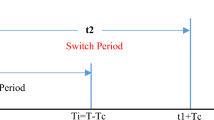Abstract
We investigate sequential investment in carbon capture and storage (CCS), i.e., the case of retrofitting a coal-fired power plant, and then invest in carbon capture and utilization (CCU) for methanol production. A (nested) compound real options model based on a backward recursive dynamic programming algorithm is used for the analysis, which seems helpful for decision-makers who have to make capital-intensive irreversible investments under high uncertainty regarding electricity and CO2 price. The options to invest in CCS and CCU are investigated individually first, and then sequentially, leading to a hybrid CCUS plant that enables both CO2 storage and methanol production. The prices of electricity, carbon and methanol are considered as stochastic and correlated with each other. Managerial flexibility exists regarding a postponement of the investment decision and the real-time optimization between selling methanol to the market or storing CO2 for earning carbon credits after establishing the CCUS plant. We find that at CO2 prices of around 40 €/t, CCS investment is economically rational, whereas CCU for methanol is not. Combining CCS with CCU increases the overall investment probability and potential for larger profits. Since methanol is more valuable than CO2, CCU can be expected to dominate the value of the compound option for the case of favorable market conditions (i.e., sufficiently high methanol and CO2 prices).
Access this chapter
Tax calculation will be finalised at checkout
Purchases are for personal use only
Similar content being viewed by others
Notes
- 1.
The same logic applies to the methanol price level as well. As the methanol price increases, the dashed line in Fig. 2c begins to rise and intersects the threshold lines at higher hydrogen prices, i.e., CCU becomes profitable at higher hydrogen prices.
References
Bos, M. J., Kersten, S. R. A., & Brilman, D. W. F. (2020). Wind power to methanol: Renewable methanol production using electricity, electrolysis of water and CO2 air capture. Applied Energy, 264, 114672.
Ravikumar, D., Keoleian, G., & Miller, S. (2020). The environmental opportunity cost of using renewable energy for carbon capture and utilization for methanol production. Applied Energy, 279, 115770.
MefCO2 Homepage http://www.mefco2.eu/mefco2.php. Accessed Dec 31, 2021.
Dixit, A., & Pindyck, R. S. (1994). Investment under uncertainty (1st ed.). Princeton University Press.
Bertsekas, D. P. (1978). Stochastic optimal control: The discrete time case (1st ed.). Athena Scientific.
Yu Q., Madlener R. (2021). Industrial utilization or storage of CO2? A compound real options valuation for the retrofitting of coal-fired power plants. FCN Working Paper No. 13/2021, Institute for Future Energy Consumer Needs and Behavior, RWTH Aachen University.
Turner, M., Iyengar, A., Woods, M. (2020). Cost and performance baseline for fossil energy plants supplement: Sensitivity to CO2 capture rate in coal-fired power plants (No. NETL-PUB-22695). National Energy Technology Laboratory (NETL)
Leonzio, G., Foscolo, P. U., Zondervan, E., & Bogle, I. D. L. (2020). Scenario analysis of carbon capture, utilization (particularly producing methane and methanol), and storage (CCUS) systems. Industrial and Engineering Chemistry Research, 59(15), 6961–6976.
Pérez-Fortes, M., Schöneberger, J. C., Boulamanti, A., & Tzimas, E. (2016). Methanol synthesis using captured CO2 as raw material: Techno-economic and environmental assessment. Applied Energy, 161, 718–732.
Öko-Institut. (2014). Klimaschutzszenario 2050. Studie im Auftrag des Bundesministeriums für Umwelt, Naturschutz, Bau und Reaktorsicherheit (2014). http://www.isi.fraunhofer.de/content/dam/isi/dokumente/ccx/2014/Bericht_Runde_1.pdf. Accessed Dec 31, 2021.
Rohlfs, W., & Madlener, R. (2011). Valuation of CCS-ready coal-fired power plants: A multi-dimensional real options approach. Energy Systems, 2(3), 243–261.
Yu Q., Madlener R. (2021). A fuzzy real options analysis of investments in coal-fired power plants retrofitted with CCS or CCU, FCN Working Paper No. 14/2021, Institute for Future Energy Consumer Needs and Behavior, RWTH Aachen University, December 2021
Author information
Authors and Affiliations
Corresponding author
Editor information
Editors and Affiliations
Rights and permissions
Copyright information
© 2023 The Author(s), under exclusive license to Springer Nature Switzerland AG
About this paper
Cite this paper
Yu, Q., Madlener, R. (2023). Industrial Use or Storage of CO2? A Compound Real Options Valuation for the Retrofitting of Coal-Fired Power Plants. In: Grothe, O., Nickel, S., Rebennack, S., Stein, O. (eds) Operations Research Proceedings 2022. OR 2022. Lecture Notes in Operations Research. Springer, Cham. https://doi.org/10.1007/978-3-031-24907-5_28
Download citation
DOI: https://doi.org/10.1007/978-3-031-24907-5_28
Published:
Publisher Name: Springer, Cham
Print ISBN: 978-3-031-24906-8
Online ISBN: 978-3-031-24907-5
eBook Packages: Business and ManagementBusiness and Management (R0)




